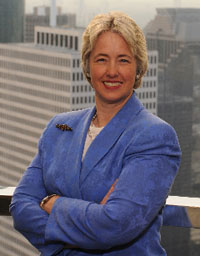Parker wins mayoral race in Houston

Annise Parker
“Tonight the voters of Houston have opened the doors to history,” said Parker, in her acceptance speech at George Brown Convention Center Saturday night. “I acknowledge that. I embrace that. I know what this win means to many of us who thought we could never achieve high office. I know what it means. I understand, because I feel it, too. But now, from this moment, let us join as one community. We are united in one goal in making this city the city that it can be, should be, might be, will be.”
Parker, 53, who has been openly gay during all 12 years of her time in elected office in Houston, was pummeled by an anti-gay campaign against her in the month-long run-off election. One effort tried to portray Parker as part of a gay takeover of the city government. Her opponent was more subtle, saying he was “not running to be a role model” but to be mayor, but news emerged late in the campaign that members of his finance committee had made sizeable donations to the campaigns opposing Parker because she is gay.
Two other openly gay candidates were seeking election in the December 12 run-off: Council incumbent Sue Lovell and Council challenger Lane Lewis. Lovell won her seat with 54 percent of the vote; Lewis failed, with only 43 percent.
According to the Houston Chronicle, Parker won with 53 percent of the vote to opponent Gene Locke’s 47 percent. The paper noted that she was not only the “first openly gay person to lead a major U.S. city” but also the first candidate in Houston in a generation to beat the candidate favored by the business establishment.
Locke led with a strategy to improve the city’s economy through new construction projects, such as a new soccer stadium. Parker, who currently serves as the city’s controller, favored a more conservative approach –including one that considers holding off on seeking to provide gay city employees with benefits for their domestic partners equal to straight employees’ spousal benefits.
With some ironic choice of words, the Chronicle reported Sunday that, “At the polls, voter after voter cited Parker’s experience watching over the city’s $4 billion budget as a primary consideration in their choice. Instead of being turned off by a politician reluctant to promise the world, voters responded to Parker’s straight talk about all that might not be possible in the coming years.”
At her victory speech Saturday night, Parker thanked her life partner, “the person who has shared my life for more than 19 years,” Kathy Hubbard, their son and two daughters, and her mother, all of who were on the stage with her along with a large crowd of other supporters.
Chuck Wolfe, president of the Gay & Lesbian Victory Fund, which helped marshal some financial support for the campaign, was also on the victory platform. He issued a statement saying her election marks a “watershed moment in American politics.”
“One of the largest cities in the country will be headed by an out lesbian, chosen by people who voted for her because of her experience and competence,” said Wolfe. “Houston rejected the politics of division and the extremists failed. After a bittersweet political year for the LGBT community, it’s nice to be able to smile this wide.”
National Stonewall Democrats, a gay partisan group that endorsed Parker, also issued its congratulations. Stonewall Executive Director Michael Mitchell said Parker’s victory is “another reminder to people across America that being authentic with one’s constituents is a winning strategy.”
Parker herself noted that the election “has changed the world for the gay, lesbian, bisexual and transgendered communities,” but added that it is also “about transforming the lives of all Houstonians for the better and that is what my admin will be about.”
“I promise to give to citizens an administration of honesty, integrity and transparency,” she said. “The only special interest will be the public. We are in this together. We rise or fall together.”
Other openly gay people have served as mayors of large cities –David Cicilline was elected mayor of Providence, Rhode island; Sam Adams, mayor of Portland, Oregon; and Ken Reeves, mayor of Cambridge, Massachusetts. Toni Atkins served as acting mayor of San Diego for one week by appointment of the city council. San Diego is the eighth largest populated city in the country; Houston is the fourth.
A native Houstonian, Parker was a leader in the Houston GLBT Political Caucus and other Texas gay political groups in the 1980s. She also worked many years for Texasgulf Oil and Gas and Mosbacher Energy, and co-owned a bookstore before running for public office. She ran for and lost her first race for a seat on the city council in 1991, then began training city police cadets on LGBT sensitivities and ran again four years later. Though she lost that second race as well, she finally won a seat –three times—then went on to win the city controller’s job in three elections. The mayoral victory Saturday night marked her seventh straight victory for public office.
Glen Maxey, the state’s first openly gay state representative, noted in his blog at dailykos.com that “the ugly undercurrent of third party attack direct mail from homophobes and right-wingers has dominated the race.” And Chronicle blogger Mike Tolson noted that Parker’s victory celebration sought to focus on the meaning of the victory to herself personally, the city generally, and to its meaning for the LGBT community nationwide.
“As those in the room expected a statement commenting on her sexual orientation, which made headlines across the country in the final days of her campaign,” wrote Tolson, “she continued, ‘I am proud, very proud, to be elected the first’ – she paused slightly – ‘the very first graduate of Rice University to be mayor of Houston.”
Her choice of campaign victory soundtrack was “We are family.”


Leave a Reply